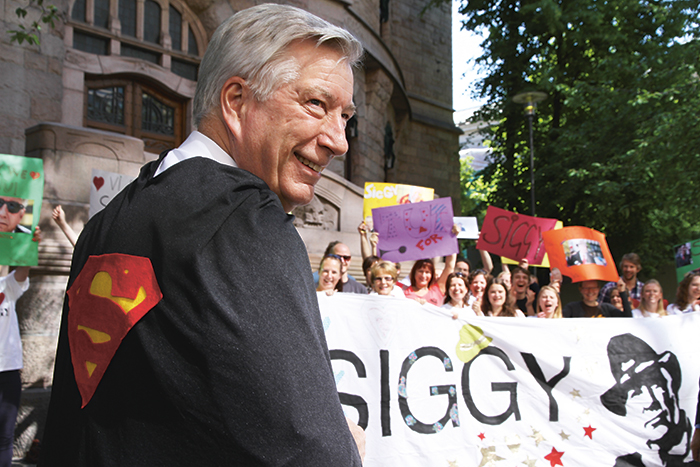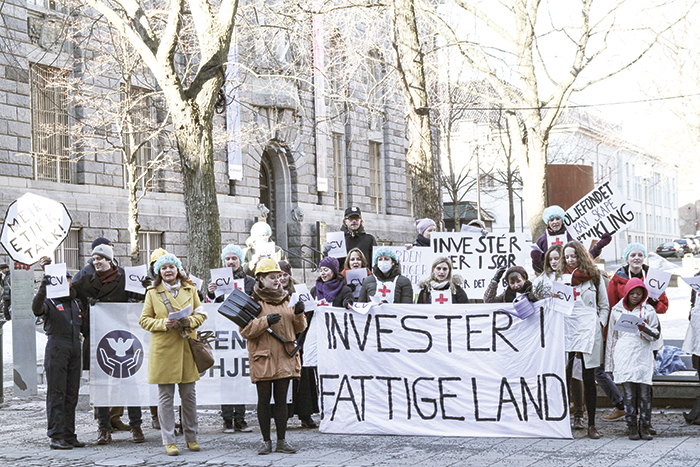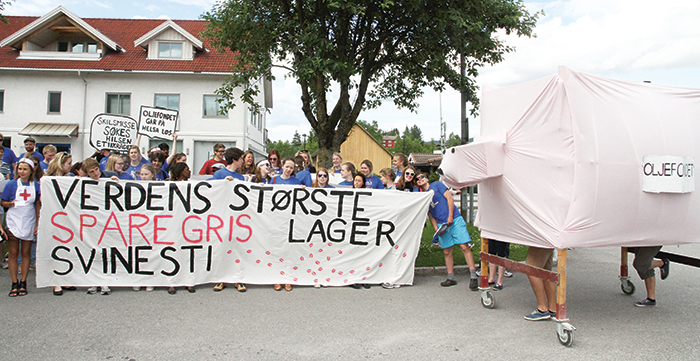
Global Report on Results

NCA is committed to addressing the root causes of poverty and injustice. To this end it isnecessary to influence the attitudes held and decisions made by the powerful and thosewho control resources on local, national and global levels. Some of the main resultsachieved from NCA’s international advocacy work during the period 2011-2014 are attributedto policy outcomes related to economic and climate justice.
In addition to the roles NCA plays in promoting economic justice and climate justice, NCA has taken a lead role in the Norwegian debate on development and policy coherence for development, holding the government accountable for ensuring that Norwegian policy areas affecting the political, economic and social rights of the poor are consistent with achieving the goals of Norwegian development policies. Examples of areas affecting development goals are policies on tax, trade, climate change, and arms trade. NCA’s efforts to ensure Norwegian policy coherence for development include presenting alternative (‘shadow’) reports complementing the government reports on the same issue, and organising “Development Conferences” in Norway in 2013 and 2014.
A key challenge with advocacy work is that success requires sustained and focused effort over often long periods of time, where political analysis and strategy, such as campaigning and mobilising people are essential to bring about change. From 2011-2014 NCA achieved some crucial political results in areas where the organisation had campaigned and lobbied over many years, such as the cancellation of illegitimate debt, tax justice and the adoption of the Arms Trade Treaty (ATT) at the UN General Assembly. NCA believes that during this strategic period we have similarly laid the groundwork for new policy changes in the years ahead.
In 2011, NCA took a leading role in economic justice advocacy in Norway, focusing primarily on the development consequences of international tax evasion and secrecy in tax havens. This was reflected in NCA’s frame agreement application to Norad, where achieving positive changes in Norwegian policies on tax justice and transparency on international capital flows were presented as NCA’s key advocacy targets.
In 2011 and 2012, NCA’s main political campaign focused on illicit capital flight and tax evasion. This campaign was based on the realisation that developing countries annually lose as much as ten times more to illicit capital flows than the combined global development assistance. Lack of tax justice drains poor countries for resources that otherwise could have been used to provide health services or education. The majority of illicit financial flows consist of tax dodging from multinational companies. NCA’s demand was crystal clear: The implementation of a comprehensive country-by-country reporting accounting standard to prevent Norwegian companies from evading taxes in developing countries. NCA collected 38,000 signatures in support of this demand. With innovative use of media and lobby activities NCA encouraged the Norwegian Minister of Finance to address the issue. After almost two years of campaigning the minister finally made a commitment to implement.
Since January 2014 Norway has had legislation for country-by-country reporting in place for extractive industries and forestry sectors. This is a major achievement for NCA and other organisations working for transparency and against tax evasion. Through its advocacy work NCA firmly put the issue on the Norwegian political agenda, raised support and contributed to changing the policy and practice.
59 The Government Pension Fund Global (formerly ‘The Government Petroleum Fund’) is the official name of what is popularly referred to as the ‘Oil Fund’. It is a fund into which the surplus wealth produced by Norwegian petroleum income is deposited and invested in various assets globally. The current value is around NOK 7,000 billion.
60 NCA’s campaign for the Norwegian Oil Fund to invest more in poor countries was broadly covered in national and international media. The report published by NCA was referred to by among others Bloomberg, Reuters, Financial Times and The Economist.
In 2013 and 2014, NCA’s primary political focus was the Norwegian Pension Fund Global59 (GPFG), challenging the fund to invest more in developing countries in order to contribute to creating decent jobs. Through lobby, creative media work and a thorough report NCA was able to set the agenda and provide policy options at politically critical moments throughout the period60. Without NCA’s contribution the issue probably would not have reached national headlines or international media.

2013 was the year running up to the last national elections in Norway and a crucial year for policy formation. NCA was therefore satisfied with the fact that several political parties included in their political programmes the issue of investing in development countries. The breakthrough came late 2013 when The Conservative Party and The Progress Party in the government declaration promised to establish a programme to invest in developing countries on a commercial basis. It was therefore an equally big disappointment when the government in May 2014 backtracked on their promise pointing to Norfund as the main source of such investments. NCA is still advocating for Norway to invest in developing countries either through the GPFG or in other ways. In the years to come, NCA will continue advocating for increased investments in ways that provide opportunities and decent work for the poor.
On 2 April 2013, the UN General Assembly finally approved a global Arms Trade Treaty (ATT), which regulates the international trade in conventional arms. The treaty included an assessment criterion for genderbased violence, for which NCA had actively lobbied.
61 A global coalition of over 100 organisations and networks led by Amnesty International, Oxfam and IANSA.
NCA had been committed to the project of ensuring a global, legally binding ATT since the initiative’s beginnings. Over the four-year period covered in this report, NCA was heavily involved in the campaign for a strong and robust treaty, with activities aimed both at the Norwegian government and the international level through the Control Arms coalition61. At the Norwegian level, the focus was on ensuring Norwegian government commitment to the ATT, and on providing suggested texts for Norwegian statements and positions throughout the diplomatic process toward a finalised treaty. NCA collaborated with other Norwegian organisations through the umbrella organisation ForUM. NCA also worked closely together with ecumenical partners, particularly the Norwegian Christian Council and the Church of Norway Council on Ecumenical and International Relations, to ensure that the faith-based engagement for disarmament and peace was communicated clearly to decision-makers.
One priority for NCA and the ecumenical network was to advocate for the inclusion of a risk assessment criterion requiring states to deny an export license if the proposed arms transfer would be likely to contribute to gender-based violence. In collaboration with faithbased partners such as the World Council of Churches NCA particularly targeted states which argued against the UN gender justice agenda, based on arguments deriving from religious or traditional points of view. While the final ATT text, including the paragraph on gender-based violence, falls short of fulfilling all of NCA’s expectations, NCA believes that its adoption is a significant step towards accountability in arms exports and a better situation for people living in contexts of armed violence. In 2014, NCA therefore continued to advocate towards the Norwegian Government and Parliament to ensure a satisfactory implementation of the treaty. Between 2013 and late 2014, the Norwegian government changed its position from arguing that no changes in the Norwegian arms export regulations were needed, to including provisions on genderbased violence in the guidelines. This was an important advocacy achievement for NCA and other Norwegian organisations. This change entails both a step towards a more coherent arms export control regime and gives a necessary signal effect at the global level. If Norway had not made these adjustments, it would have been much easier for other important arms exporting states to argue that no changes to their respective export control regimes were needed by referring to Norway.
In 2011, Norwegian civil society and politicians were still marked by a fatigue after the failed climate negotiations in Copenhagen (2009). NCA observed that Norwegian emissions were still rising, that the promised climate finance was not delivered and that partners in the Global South increasingly reported climate induced catastrophes and consequences. All this taken into account, NCA decided to strengthen its lobby and campaign work as the climate negotiations in Paris in December 2015 were approaching.
Climate change is happening right now and hits hardest those who have contributed the least to it. NCA’s policies and advocacy work is based on the principles of climate justice, more concretely the countries’ historic responsibility and economic capacity.
NCA has identified our specific role in the climate policy debate. NCA highlights those who have been affected by climate change, the so-called ‘climate witnesses’, by bringing their stories to the Norwegian media. Furthermore, NCA focuses on climate finance and mitigation of emissions in Norway. Internationally NCA works together with partners and the ACT Alliance to address issues of an equitable burden sharing between countries.
62 NCA Report
63 Arendalsuka is an annual forum in Arendal, Norway, where national delegates in politics, society and industry meet each other and the public, to debate and develop policies for the present and future.
Even though progress related to climate justice is slow, NCA has reached some important milestones. In a report launched by NCA in 2014, researchers calculated what Norway’s fair share of the global climate effort should be62. The report sparked massive media debate and dominated the first day of ‘Arendalsuka’63. Several NGOs and political parties have later picked up the rationale presented in the report, referring to the principles of historic responsibility and economic capacity and used it as a basis for policies.
In the international climate negotiations, the Norwegian Minister of Climate and Environment has started addressing the need for a climate agreement which is ambitious and fair. The Norwegian Government has increased its support to the Adaptation Fund after NCA’s campaigning in 2013, like it did with the Green Climate Fund in 2014. NCA has managed to curb the use of the claim that Norwegian petroleum production is necessary because of global poverty and established the principles of historic responsibility and capacity when calculating a country’s fair share of the climate effort.
Countries were asked to submit their indicative climate goals to the UN Framework Convention on Climate Change (UNFCCC) by the end of March 2015. NCA gave inputs to the political leadership in the Norwegian Department of Climate and Environment. There were traces of NCA’s lobby efforts in the Norwegian official document, especially concerning the issues of historic responsibility and economic capacity.
NCA has also helped build and contributed with climate expertise to an interfaith coalition consisting of Christians, Muslims, Jews and Sikhs in Norway. NCA believes this interfaith coalition is a valuable contribution to the climate debate in Norway. NCA also engages in interfaith coordination through the ACT Alliance and the World Council of Churches.
NCA’s youth organisation, Changemaker, is Norway’s largest youth organisation focusing on development issues. The organisation aims to erase the root causes of global injustice. By offering youth concrete options for action, Changemaker engages youth in the struggle for a just world with the slogan “Of course we can change the world!”. Changemaker is known to be a creative, capable and progressive political actor in Norway. The organisation’s strength is to communicate complicated political issues in an understandable and creative way. In recent years, Changemaker has had marked influence on political issues like illegitimate debt and responsible finance; climate justice; the Norwegian weapon export and the development of the Arms Trade Treaty.

64 Changemaker Report
65 Aftenposten
In 2012, Changemaker launched the campaign “Ethical oil fund”64. The campaign pointed to the fact that the Norwegian people’s pension is invested in companies that violate human rights. The political goals of the campaign were to secure more resources and decision-making power to the fund’s Council of Ethics, responsible for surveilling companies in the portfolio suspected of breaking the ethical guidelines of the fund. The campaign successfully put the ethical issues of the fund’s investments on the political and the public agenda in Norway. The Ministry of Finance responded to the campaign by placing a temporary expert council tasked with suggesting ways in which the fund should be organised in the future. The expert council recommended to close down the operations of the Council of Ethics. Changemaker, on their hand, appealed for the strengthening of the Council of Ethics and managed to spark a media debate65. As a result of these efforts, the Council of Ethics still exists and the debate over enhanced funding for the Council is again an important political topic.
Next Chapter: 8. Lessons Learned
Back